《管理学》课程教学资源(课件讲义)Stephen P.Robbins(9)Chapter 1 Introduction to Management and Organizations
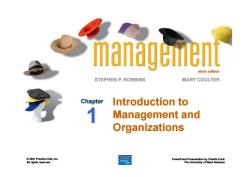
management ninth edition STEPHEN P.ROBBINS MARY COULTER Chapter Introduction to Management and Organizations Rag7erameh,1nc PEARSON PowopolaBUang义GttAeSoat
ninth edition STEPHEN P. ROBBINS STEPHEN P. ROBBINS MARY COULTER MARY COULTER Chapter Introduction to 1 Management and Organizations PowerPoint Presentation by Charlie Cook The University of West Alabama © 2007 Prentice Hall, Inc. All rights reserved
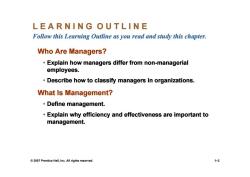
LEARNING OUTLINE Follow this Learning Outline as you read and study this chapter. Who Are Managers? Explain how managers differ from non-managerial employees. Describe how to classify managers in organizations. What Is Management? ·Define management. Explain why efficiency and effectiveness are important to management. 2007 Prentice Hall,Inc.All rights reserved. 1-2
LEARNING OUTLINE L E A R N I N G O U T L I N E Follow this Learning Outline as you read and study this chapter. Who Are Managers? • Explain how managers differ from non Explain how managers differ from non-managerial managerial employees. • Describe how to classify managers in organizations. What Is Management? • Define management. • Explain why efficiency and effectiveness are important to management. © 2007 Prentice Hall, Inc. All rights reserved. 1–2
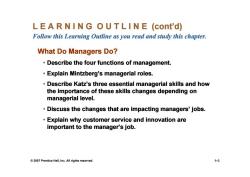
LEARNING OUTLINE (cont'd) Follow this Learning Outline as you read and study this chapter. What Do Managers Do? Describe the four functions of management. Explain Mintzberg's managerial roles. Describe Katz's three essential managerial skills and how the importance of these skills changes depending on managerial level. Discuss the changes that are impacting managers'jobs. Explain why customer service and innovation are important to the manager's job. 2007 Prentice Hall,Inc.All rights reserved. 1-3
L E A R N I N G O U T L I N E (cont L E A R N I N G O U T L I N E (cont d) (cont d) ’ Follow this Learning Outline as you read and study this chapter. What Do Managers Do? • Describe the four functions of management. • Explain Mintzberg’s managerial roles. • Describe Katz’s three essential managerial skills and how the importance of these skills changes depending on managerial level. • Discuss the changes that are impacting managers’ jobs Discuss Discuss the changes changes that are impacting impacting managers’ managers’ jobs. • Explain why customer service and innovation are important important to the manager important to the manager s manager s’ job. © 2007 Prentice Hall, Inc. All rights reserved. 1–3
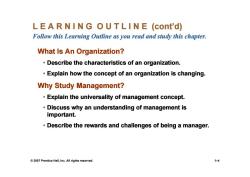
LEARNING OUTLINE (cont'd) Follow this Learning Outline as you read and study this chapter. What Is An Organization? Describe the characteristics of an organization. Explain how the concept of an organization is changing Why Study Management? Explain the universality of management concept. Discuss why an understanding of management is important. Describe the rewards and challenges of being a manager. 2007 Prentice Hall,Inc.All rights reserved. 1-4
L E A R N I N G O U T L I N E (cont L E A R N I N G O U T L I N E (cont d) (cont d) ’ Follow this Learning Outline as you read and study this chapter. What Is An Organization? • Describe the characteristics of an organization. • Explain how the concept of an organization is changing. Wh yy g Stud y Mana gement? • Explain the universality of management concept. • Discuss why an understanding of management is Discuss Discuss why an understanding understanding of management management is important. • Describe the rewards and challen Describe the rewards and challen g gg es of bein es of bein g a mana ger. © 2007 Prentice Hall, Inc. All rights reserved. 1–4
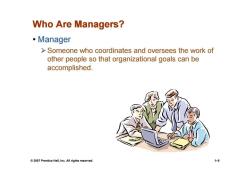
Who Are Managers? 。Manager >Someone who coordinates and oversees the work of other people so that organizational goals can be accomplished. 2007 Prentice Hall,Inc.All rights reserved. 1-5
Who Are Managers? • Manager ¾S h di t d th k f Someone w omeone who coordinates and oversees oversees the work of other people so that organizational goals can be accomplished. © 2007 Prentice Hall, Inc. All rights reserved. 1–5
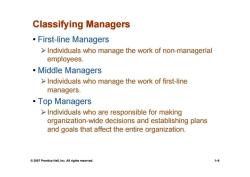
Classifying Managers First-line Managers >Individuals who manage the work of non-managerial employees. ·Middle Managers >Individuals who manage the work of first-line managers. 。Top Managers >Individuals who are responsible for making organization-wide decisions and establishing plans and goals that affect the entire organization. 2007 Prentice Hall,Inc.All rights reserved. 1-6
Classif Classifyg g in Managers • First-line Managers line Managers ¾I di id l h th k f Individuals who manage o manage the work of non-manager manageri l a employees. • Middl M Middle Managers ¾Individuals who manage the work of first Individuals who manage the work of first-line managers. • Top Managers ¾Individuals who are responsible for making organization organization-wide decisions and establishing plans wide decisions and establishing plans and goals that affect the entire organization and goals that affect the entire organization organization. © 2007 Prentice Hall, Inc. All rights reserved. 1–6
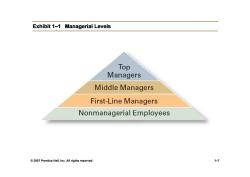
Exhibit 1-1 Managerial Levels Top Managers Middle Managers First-Line Managers Nonmanagerial Employees 2007 Prentice Hall,Inc.All rights reserved. 1-7
Exhibit 1 Exhibit 1–1 Managerial Levels © 2007 Prentice Hall, Inc. All rights reserved. 1–7
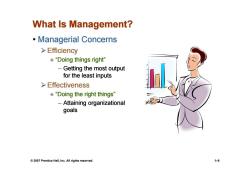
What Is Management? ·Managerial Concerns >Efficiency g“Doing things right'" -Getting the most output for the least inputs >Effectiveness g“Doing the right things” -Attaining organizational goals 2007 Prentice Hall,Inc.All rights reserved. 1人8
What Is Mana gement? • Managerial Concerns ¾Effi i c ency “Doing things right” – Getting the most output Getting Getting the most output for the least inputs ¾Effectiveness “Doing the right things” – Attaining organizational goals © 2007 Prentice Hall, Inc. All rights reserved. 1–8
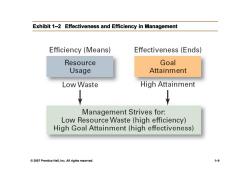
Exhibit 1-2 Effectiveness and Efficiency in Management Efficiency (Means) Effectiveness(Ends) Resource Goal Usage Attainment Low Waste High Attainment Management Strives for: Low Resource Waste (high efficiency) High Goal Attainment(high effectiveness) 2007 Prentice Hall,Inc.All rights reserved. 1-9
Exhibit 1 Exhibit 1–2 Effectiveness and Efficienc Effectiveness and Efficiency g in Management © 2007 Prentice Hall, Inc. All rights reserved. 1–9
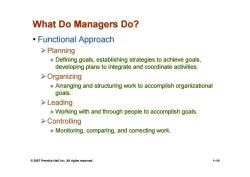
What Do Managers Do? ·Functional Approach >Planning Defining goals,establishing strategies to achieve goals, developing plans to integrate and coordinate activities. >Organizing Arranging and structuring work to accomplish organizational goals. >Leading Working with and through people to accomplish goals. >Controlling Monitoring,comparing,and correcting work. 2007 Prentice Hall,Inc.All rights reserved. 1-10
What Do Managers Do? • Functional Approach ¾Pl i ann ng Defining goals, establishing strategies to achieve goals, developing developing plans to integrate and coordinate activities. developing plans to integrate integrate and coordinate coordinate activities. activities. ¾Organizing Arrangg g p g ing and structurin and structuring work to accom work to accomplish or lish organizational anizational goals. ¾Leading Working with and through people to accomplish goals. ¾Controlling M it i i d ti k Monitoring, compar ng, comparing, and correcting work. © 2007 Prentice Hall, Inc. All rights reserved. 1–10
按次数下载不扣除下载券;
注册用户24小时内重复下载只扣除一次;
顺序:VIP每日次数-->可用次数-->下载券;
- 《管理学》课程教学资源(教师手册)Stephen P.Robbins(9)CHAPTER TWO Management Yesterday.pdf
- 《管理学》课程教学资源(教师手册)Stephen P.Robbins(9)CHAPTER ONE Introduction to Management.pdf
- 《管理学》课程PPT教学课件(Management)Stephen P.Robbins(9)第十二章 人力资源管理 Human Resource Management.ppt
- 《管理学》课程PPT教学课件(Management)Stephen P.Robbins(9)第十章 组织结构与设计 Organizational Structure and Design.ppt
- 《管理学》课程PPT教学课件(Management)Stephen P.Robbins(9)第十五章 理解群体与团队 Understanding Groups and Teams.ppt
- 《管理学》课程PPT教学课件(Management)Stephen P.Robbins(9)第十九章 运营及价值链管理 Operations and Value Chain Management.ppt
- 《管理学》课程PPT教学课件(Management)Stephen P.Robbins(9)第三章 组织文化与环境——约束力量 Organizational Culture and Environment - The Constraints.ppt
- 《管理学》课程PPT教学课件(Management)Stephen P.Robbins(9)第二章 管理的昨天和今天 Management Yesterday and Today.ppt
- 《管理学》课程PPT教学课件(Management)Stephen P.Robbins(9)第五章 社会责任与道德管理 Social Responsibility and Managerial Ethics.ppt
- 《管理学》课程PPT教学课件(Management)Stephen P.Robbins(9)第四章 全球环境中的管理 Managing in a Global Environment.ppt
- 《管理学》课程PPT教学课件(Management)Stephen P.Robbins(9)第六章 制定决策——管理者工作的实质 Decision-Making - The Essence of the Manager’s Job.ppt
- 《管理学》课程PPT教学课件(Management)Stephen P.Robbins(9)第八章 战略管理 Strategic Management.ppt
- 《管理学》课程PPT教学课件(Management)Stephen P.Robbins(9)第十六章 激励员工 Motivating Employees.ppt
- 《管理学》课程PPT教学课件(Management)Stephen P.Robbins(9)第十一章 管理沟通与信息技术 Communication and Information Technology.ppt
- 《管理学》课程PPT教学课件(Management)Stephen P.Robbins(9)第一章 管理与组织导论 Introduction to Management and Organizations.ppt
- 《管理学》课程PPT教学课件(Management)Stephen P.Robbins(9)第七章 计划的基础 Foundations of Planning.ppt
- 新疆大学:《管理学》课程教学课件(PPT讲稿)第十五章 控制方法.ppt
- 新疆大学:《管理学》课程教学课件(PPT讲稿)第十四章 控制与控制过程.ppt
- 新疆大学:《管理学》课程教学课件(PPT讲稿)第四篇 领导 第十二章 激励.ppt
- 新疆大学:《管理学》课程教学课件(PPT讲稿)第四篇 领导 第十三章 沟通.ppt
- 《管理学》课程教学资源(课件讲义)Stephen P.Robbins(9)Chapter 2 Management Yesterday and Today.pdf
- 《管理学》课程PPT教学课件(Management, 7th Edition)Chapter 06 DECISION MAKING:THE ESSENCE OF THE MANAGER’S JOB.ppt
- 《管理学》课程PPT教学课件(Management, 7th Edition)Chapter 07 FOUNDATIONS OF PLANNING.ppt
- 《管理学》课程PPT教学课件(Management, 7th Edition)Chapter 08 STRATEGIC MANAGEMENT.ppt
- 《管理学》课程PPT教学课件(Management, 7th Edition)Chapter 09 PLANNING TOOLS AND TECHNIQUES.ppt
- 《管理学》课程PPT教学课件(Management, 7th Edition)Chapter 10 ORGANIZATIONAL STRUCTURE AND DESIGN.ppt
- 《管理学》课程PPT教学课件(Management, 7th Edition)Chapter 11 MANAGERIAL COMMUNICATION AND INFORMATION TECHNOLOGY.ppt
- 《管理学》课程PPT教学课件(Management, 7th Edition)Chapter 12 HUMAN RESOURCE MANAGEMENT(HRM).ppt
- 《管理学》课程PPT教学课件(Management, 7th Edition)Chapter 13 MANAGING CHANGE AND INNOVATION.ppt
- 《管理学》课程PPT教学课件(Management, 7th Edition)Chapter 14 FOUNDATIONS OF BEHAVIOR.ppt
- 《管理学》课程PPT教学课件(Management, 7th Edition)Chapter 15 UNDERSTANDING GROUPS AND TEAMS.ppt
- 《管理学》课程PPT教学课件(Management, 7th Edition)Chapter 16 MOTIVATING EMPLOYEES.ppt
- 《管理学》课程PPT教学课件(Management, 7th Edition)Chapter 18 FOUNDATIONS OF CONTROL.ppt
- 《管理学》课程PPT教学课件(Management, 7th Edition)Chapter 19 OPERATIONS AND VALUE CHAIN MANAGEMENT.ppt
- 《管理学》课程PPT教学课件(Management, 7th Edition)Chapter 20 CONTROLLING FOR ORGANIZATIONAL PERFORMANCE.ppt
- 《管理学》课程教学资源(实验讲义)企业竞争模拟攻略篇.pdf
- 《管理学》课程教学资源(习题与答案)第1章 管理活动与管理理论.doc
- 《管理学》课程教学资源(习题与答案)第3章 全球化与管理.doc
- 《管理学》课程教学资源(习题与答案)第6章 计划与计划工作.doc
- 《管理学》课程教学资源(习题与答案)第十章 组织变革与组织文化.doc
